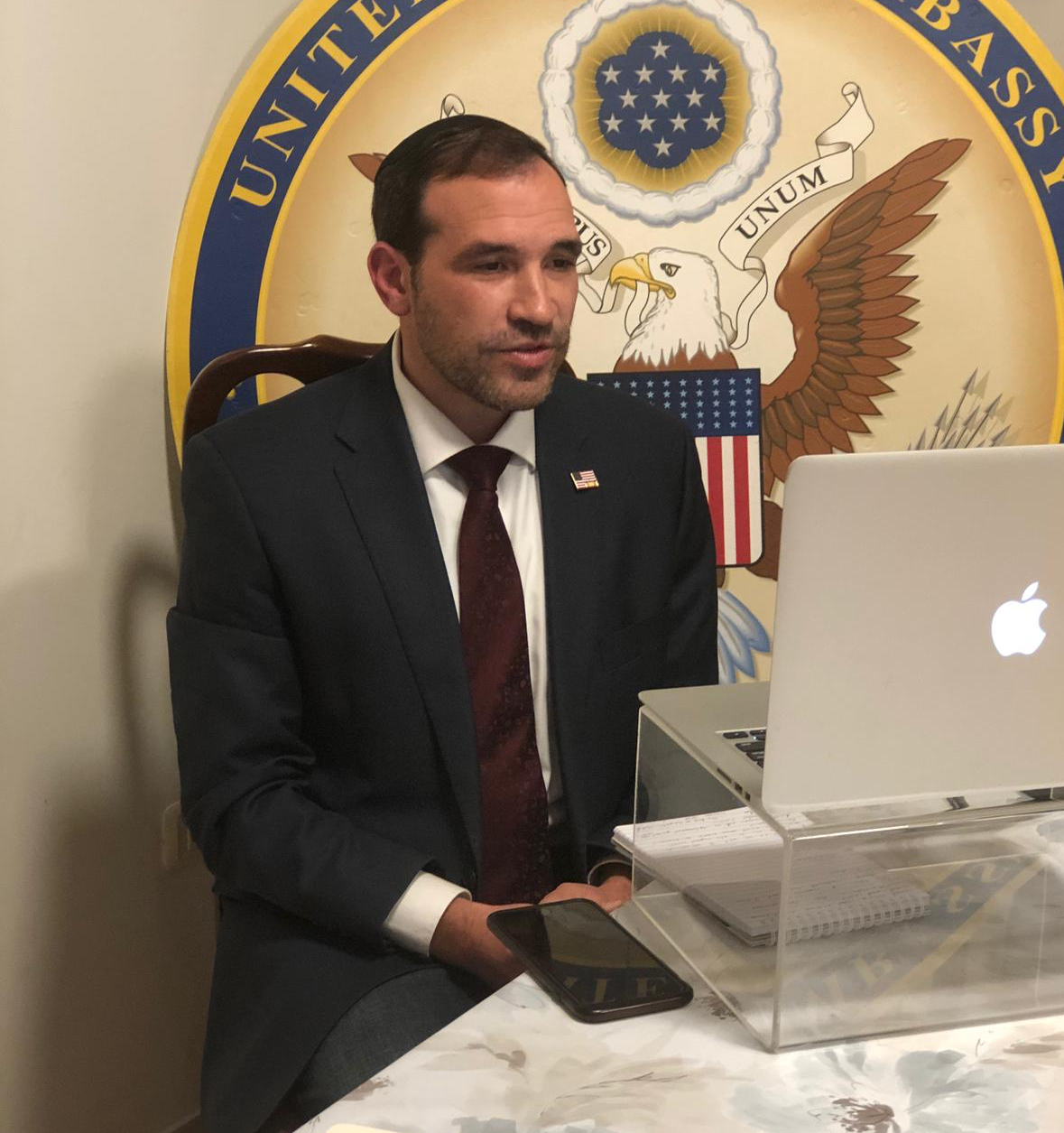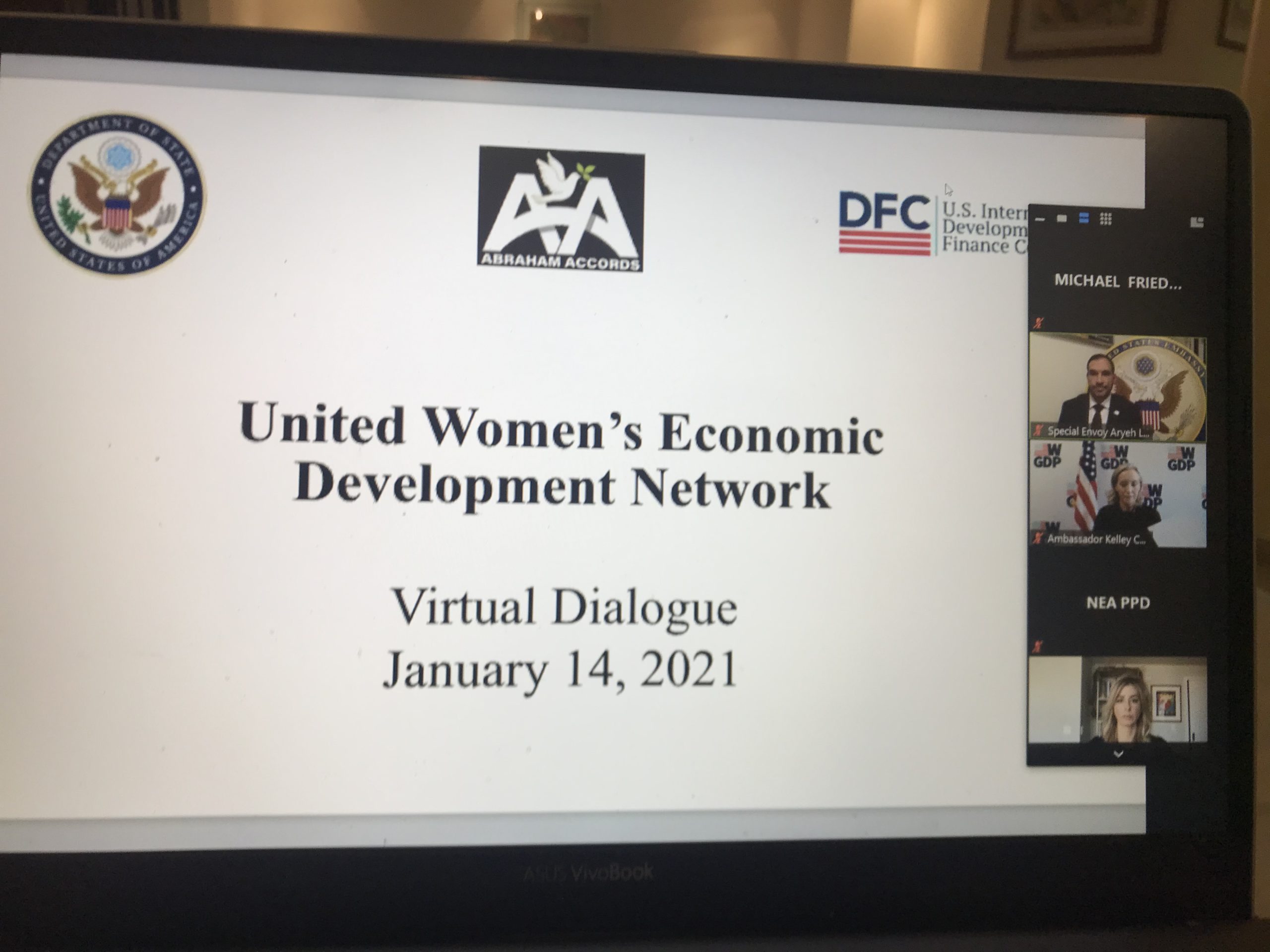Faces of women business leaders and entrepreneurs from the United States, Bahrain, Morocco, Israel, United Arab Emirates, Sudan, Uzbekistan and Kosovo encircled computer screens of participants in the first virtual meeting and launch of the United Women’s Economic Development Network.
The US Special Envoy for Economic Normalization Aryeh Lightstone was glowing with pride. The only male in the online room began his remarks expressing his only regret: that the moment was not transpiring in person.
Welcoming the distinguished women, Lightstone said, “We have eight countries and seven times zones filled with the dynamic, enterprising and leadership women from quite literally across the globe. What we are about to launch right here, right now, is not only historic but indeed, it is the creation of history.”
“[The year] 2020 is going to be seen in history for two things, and probably two things only. No. 1 is [the] COVID-19 virus that has paralyzed the world. And it will be remembered for what leaders of some great countries did for the world,” he said referencing the Abraham Accords, the series of normalization agreements between Israel, the United Arab Emirates, Bahrain, and Sudan. Morocco is the fourth Arab nation, although it eschews formal inclusion in the Accords’ framework.

Special Envoy Aryeh Lightstone (Felice Friedson/The Media Line)
Self-described as a business person by nature, Lightstone noted that in business you look for trends and that he sees the trends of women’s economic empowerment as positive. “The Middle East and the broader North Africa area is changing from a place of frustration to a place of solution and salvation,” Lightstone said, concluding his remarks by asserting that the women leaders at the virtual event “are building on the Abraham Accords.”
Lightstone, the conceptualizer of the network, told The Media Line, “It was at the Abraham Accords Business Summit, that I was sitting across the table from a very dynamic female entrepreneur who turned to me and said: ‘First of all, women-run businesses in the region are booming. We are on the ascendency. Secondarily, it is different to be a woman entrepreneur and leader in this part of the world than in other parts of the world. It would be beneficial if we created a network to support each other.’”
The event was hosted by US Ambassador-at-Large for Global Women’s Issues Kelley Currie, Special Envoy Lightstone, and US International Development Finance Corporation Senior Vice President and Managing Director of Global Women’s Issues Charity Wallace.
Having just returned from Rabat, Morocco, Currie spoke about the Women’s Global Development and Prosperity initiative, GDPS 2X MENA, which was launched last week. It represents a billion-dollar commitment to invest in women in the region. Currie sees the network, which was co-founded by Marwa Al Mansoori, an Emirati entrepreneur and board member of the UAE’s Economic Collaboration Committee; and Netta Korin, co-founder of Israel’s largest blockchain infrastructure Orbs, as a complementary organization to American objectives that contribute to peace in the region.
“Thanks to the United States’ leadership, the Middle East and North Africa is experiencing the most rapid geopolitical transformation,” she said.
Currie sees the Women’s Global Development and Prosperity Initiative as a holistic approach to advancing women’s free participation in the economy.
“We aim to reach 50 million women across the developing world by the year 2025. We are proud to say that in our first two years of the initiative, we have reached more than 24 million women.
“The White House Council of Economic Advisors found that removing barriers [such as women’s access to financial institutions and building credit] could increase the global GDP by $7 trillion, especially in this era of the pandemic and the economic effects of it. That’s value we can no longer afford to be leaving on the table by keeping women on the sidelines of the economy,” Currie said.

Screenshot during virtual meeting
Leading Women in the Network
Her Excellency Dr. Shaikha Rana bint Isa Al Khalifa, who is an undersecretary in the Bahraini Foreign Ministry, spoke of several esteemed political and business leaders from Bahrain. “It is worth noting that this forward-looking vision for women’s advancement is deeply seeded in the history of Bahrain and is considered a natural progression of the trajectory of Bahraini women in a history that is painted in regional firsts.”
The undersecretary pointed to the fact that the first public schools for girls were opened in the 1920s and in the 1930s, women participated in municipal elections. “In the 1970s, the first Bahraini women starting working in diplomacy and in the 1990s, the first female ambassador was named on a mission to represent Bahrain to one of its most crucial allies.”
Addressing the network, the undersecretary reflected on her role as one of the leading women in the region. “I personally have the honor of being the undersecretary of the Ministry of Foreign Affairs of the Kingdom of Bahrain, which I am very proud of not least because it enshrines the royal confidence of His Majesty the King but also since I am the first woman in the Arabian Gulf region to hold this position. This fact serves as a testament to the strides that have been made over the years to advance the position of women in every country.”
Al Khalifa told The Media Line that it was an honor to participate in the launch of the United Women’s Economic Development Network. “As one of the outcomes of the historic Abraham Accords, this fresh and vital initiative will no doubt work hand-in-glove with the overall peace process,” she said.
Korin met Lightstone when she was an adviser to then-Israeli Deputy Minister Michael Oren. Echoing Lightstone’s sentiment on the concept of the network, Korin said, “How can I help? Let’s get this off the ground as soon as possible.”
Korin told The Media Line, “To have the ability to take my experience and my knowledge from the private industry and government work in philanthropy, to be able to use that and assist in making real connections … I’m strengthening bonds with countries in the Middle East and it’s a real privilege.”
Co-founder of Orbs, the largest blockchain infrastructure company, and the Hexa Foundation which utilizes Orbs technology, Korin said she “looks at our region specifically, and sees how we can use our technology to improve the lives of people. There is so much potential for social impact.”
During the virtual conference, Korin told the impressive lineup of women that “part of my efforts include proposals for tracking foreign aid and donations in order to ensure that monies donated or invested get to their desired end target.”
Korin, one of several successful Israelis represented, is a force who has lectured and mentored other women in her country. She tells The Media Line, “Growing up on Wall Street, I had no female role models and I had to make my way in a man’s world, and that was very challenging. And I succeeded and that’s wonderful, but it would have been much easier if I had someone who is female showing me the ropes, most likely, significantly healthier than the experiences I went through.”
Korin changed careers many times in her life. “I started on Wall Street, then owned a restaurant, was advising the government and now I’m in high-tech, and each time there is a learning curve. Each one of these experiences taught me how to approach a new venture, and a significant lesson I learned was how to be patient, especially on the macro level where governments are concerned.
“I’m entering this [the network], and I think all the women are entering this with an understanding that we’re in this for our daughters and our granddaughters, and not necessarily for what we are going to get out of this in a year or two. You know, as women are 50% of the population, we have a voice and it’s an important one. A woman can do anything she wants. She can be an F-16 pilot or she can be a prime minister.”
The second co-founder of the network, Al Mansoori, is the woman Lightstone met at the Abraham Accord Business Summit who conceived the idea. “I’m part of the board of the Economic Collaboration Committee in the UAE, which is connecting the private and public sectors.
Educated in the United States and Scotland, 28-year-old Al Mansoori is self-made, overseeing five holding companies including Malena, the first mobile platform for plastic surgery and cosmetology.
For Al Mansoori and others like her, the Abraham Accords is not just a peace treaty – it’s future opportunities and future collaboration for opportunities.
Drawing on her own experience, Al Mansoori tells The Media Line that creating opportunities for the next generation is extremely important to her. Her father encouraged her to be independent and she wants to see the same for others.
“When I say next generation, I mean under 20. Ninety percent of the people will follow what the society and community goes through, especially when it comes to women. This is what people forget, especially here in the Middle East.
“When you attend a women’s summit which comes one day a year, you exchange business cards and usually nothing happens. When you know a person, you can see what mutual alignment can happen. Whether it is knowledge transfer which saves time.
“The Women’s Network is not one person, but us collaborating together creating opportunities for the future generations, impacting the future generation of women and girls and having a say. The women involved are decision-makers. How we got there is not easy. We care about the next generation, that we can create a solid bridge between countries, a solid bridge that can enhance opportunities. This is what will make a difference.
“It is easy how social media can influence young girls; why can’t we influence them?”